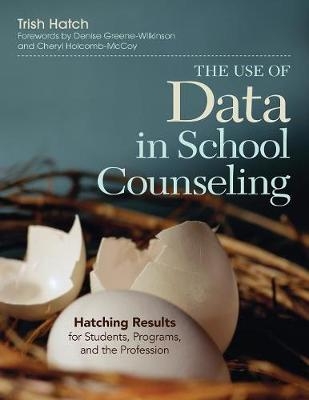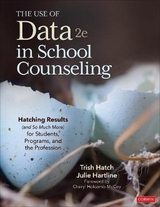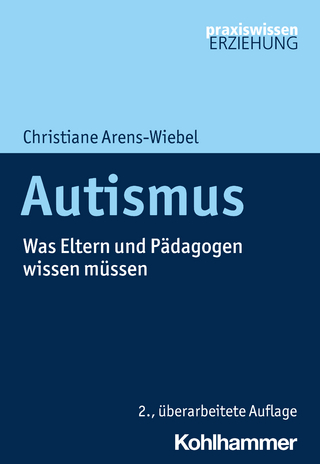
The Use of Data in School Counseling
Corwin Press Inc (Verlag)
978-1-4522-9025-6 (ISBN)
- Titel erscheint in neuer Auflage
- Artikel merken
Reach ALL students and prove how critical your counselling program is!
For school counsellors, using data effectively doesn’t have to be a burden. Data can make the difference for today’s embattled school counselling programs, and this insightful book shows how to collect and manage it.
School counseling scholar and advocate Dr. Trish Hatch describes how K–12 counsellors can replace "random acts of guidance" with intentional, well-timed interventions, based on student data. Aligned with current research and the American School Counselor Association (ASCA) standards, this essential resource includes a complete set of tools and templates for data collection, action-planning and reporting. Readers will learn how to
Develop a robust counselling curriculum that supports the Common Core Standards and drop-out prevention
Replace "random acts of guidance" with intentional, well-timed interventions that are based on student needs
Measure progress through pre- and post-assessments
Deliver compelling reports that demonstrate your program’s impact
Trish Hatch, Ph.D., retired as a professor at San Diego State University (SDSU) in August of 2019 and was recently awarded Professor Emeritus status. During her tenure, Dr. Hatch served as Director of the School Counseling Program from 2004-2015 and as Executive Director of SDSU’s Center for Excellence in School Counseling and Leadership. She is the best-selling author of The Use of Data in School Counseling (2013) and co-author of Evidence-Based School Counseling: Making a Difference with Data-Driven Practices (Dimmitt, Carey, and Hatch, 2007) and the ASCA National Model: A Framework for School Counseling Programs (ASCA, 2003, 2005). These books, as well as the three most recent collaborative texts that focus on implementing elementary and secondary school counseling programs, are used throughout the world in the preparation and professional development of school counselors. Trish recently self-published Pilots, Passengers, Prisoners and Hijackers: An Educator’s Guide to Handling Difficult People While Moving Forward (2018), a book derived from nearly 20 years of workshops and keynote speeches she’d given on the topic. Regarded within the profession as an advocate and national leader, Dr. Hatch served as a consultant and advisor on school counseling and educational issues for the White House and the U.S. Department of Education under the Obama administration. In 2014, she co-led the organization and planning of the second “invitation-only” White House Convening on School Counseling at SDSU. A former school counselor, site and central office administrator, state association president, and American School Counselor Association (ASCA) Vice President, Dr. Hatch has received multiple national awards, including ASCA’s Administrator of the Year award and its highest honor, the Mary Gehrke Lifetime Achievement award. She most recently received the National Association for College Admission Counseling’s (NACAC) Excellence in Education Award, previously awarded to First Lady Michelle Obama and Senator Tom Harkin, as well as the inaugural California Association of School Counselors’ School Counselor Educator of the Year award. As President and CEO of Hatching Results, LLC, Dr. Hatch leads a team of award-winning school counseling professionals who provide training and consultation to school districts across the country.
Learning Targets
About the Author
Foreword
Introduction
1. Implementing School Counselor Common Core Standards: “Every Student Gets Every THING”
Standards-Based Education
Implementing the Common Core: The Role of the School Counselor
ASCA and Standards-Based Education
School Counselor Core [*Guidance] Curriculum
Schoolwide Core Curriculum Action Plans
2. Intentional Guidance: “Some Kids need MORE”
What is Intentional Guidance?
Intentional Guidance and:
ASCA National Model
ASCA Professional Competencies
Evidence-Based Practices
Response to Intervention (RTI) and Positive Behavior Interventions and Supports (PBIS)
Dropout Prevention Education
Intentional Guidance? Or Intentional School Counseling?
3. The Use of Data to Drive Interventions
School Counselor Data Proficiency
Data Pre- Test
Types of Data
Disaggregation of Data
Setting Reasonable Measureable Outcome Goals
Federal Grants Call for More Data-Driven Decision-Making
4. Program Evaluation : Using Data to Evaluate Interventions
Process Data: “What You Did For Whom”
Perception Data: “Did You ASK?”
Results Data “So What?”
Hatching Results Conceptual Diagrams
Intentional Guidance for Systems Change
Data Over Time
Where Do I Start? What Data Should We Look at Every Year?
A Word About Data Addiction
5. Action Plans: A Two-Pronged Approach
School Counseling Core Curriculum: “Every Student Get Every Thing”
Guidelines for Using Curriculum Action Plans
Sample Curriculum Action Plans
Intentional Guidance: “Some Kids Need More”
Guidelines for Using Intentional Guidance Action Plans
Sample Intentional Guidance Action Plans
6. Determining Curriculum and Interventions
Data-Driven Curriculum Decisions
Rethinking the Purpose of Faculty Needs Assessments
Curriculum Needs Assessment Surveys
Intentional Guidance Intervention Decisions
The Fishnet Approach
Student At-Risk Surveys
School Counselor Referral Forms
Menu of Services
Evidence-Based Approach to Curriculum
7. Creating Pre-Post Tests
Why Assessment? “We are Teachers Too”
A-S-K (ASK Them What They Learned)
Attitude: How is an Attitude Question Created?
Knowledge: How is a Knowledge Question Created?
Skills: What Types of Questions Should the School Counselor Ask to Assess Skills?
Get Real About Violence Pre-Post Test (Sample)
Common Questions About Pre-Post Tests
Hints for Creating and Administering Pre-Post Tests
You Don’t Know What They Know Until You Know What They Know
Online Products
Silva’s Story
Analyzing and Improving Pre-Post Tests
8. Intentional Guidance for Systems Change
School Counselors as Social Justice Advocates
Programs and Activities
Policies and Practices
Access and Opportunity
Taking Action
Data Teams
Activity: Who Falls Through the Cracks?
Using Data to Tell Your Story
Advocacy Thoughts from Reese House
Intentional Guidance Action Plans for Systems Change
9. Finding (Making) Time - Setting Priorities
Time and Choice
Busy Professionals? Or Always Available?
Are School Counselors Starters or Utility Players
Is This a Good Use of A Master’s Degree?
The Annual Agreement
Ratios and Time
Making Choices on Spending Time
Time Trackers
“Plates are Full” Activity
FAQ and Time Suckers
School Counseling Program Organizational Evaluation
10. Reporting Results
Program Evaluation vs. Research
Results Reports
Program / Activity Evaluation
Program Improvement
Student Advocacy
Systemic Change
Program Advocacy ~ Multiple Tools for Sharing Results
Filling out the Results Report
Impact Over Time
Calculating Percentages Using “The David Effect”
Creating Graphic Representations of Data
Common Mistakes and Pitfalls
11. Reporting Results via the Flashlight Approach
The Flashlight Approach (Measuring ONE Thing – Well)
Flashlight Rating Scale Rubric
Flashlight Instructions: Curriculum Lesson Detailed Walkthrough
Flashlight Instructions: Intentional Guidance Detailed Walkthrough
12. Flashlight Packages – “Putting it all Together”
Flashlight Packages Introduction
Program Evaluation Reflection (Barbara Smith)
Guidance Curriculum Flashlight Package
Intentional Guidance Flashlight Package
Reflections
CESCaL Flashlights Online
Summary
13. Today’s Professional School Counselor Does Make a Difference
Logic Model for Success
Preparing the Soil
Realistic Evaluation Activity Questions
Owners or Renters?
Professional School Counselors
Pilots, Passengers, Prisoners, and Hijackers (P3H)
Thoughts on Complex Resistance
Seeing Obstacles as Opportunities
Resolving (Avoiding) the Bermuda Triangle of Counseling
Data Does Work!
Final Thoughts
Appendix
Flashlight Package Exemplars
Action Plans Examples
Research Quotes for Flashlight Presentations
Curriculum Resources
Index
| Verlagsort | Thousand Oaks |
|---|---|
| Sprache | englisch |
| Maße | 215 x 279 mm |
| Gewicht | 1130 g |
| Themenwelt | Sozialwissenschaften ► Pädagogik ► Sonder-, Heil- und Förderpädagogik |
| Sozialwissenschaften ► Pädagogik ► Sozialpädagogik | |
| Sozialwissenschaften ► Soziologie | |
| ISBN-10 | 1-4522-9025-3 / 1452290253 |
| ISBN-13 | 978-1-4522-9025-6 / 9781452290256 |
| Zustand | Neuware |
| Haben Sie eine Frage zum Produkt? |
aus dem Bereich



